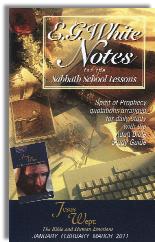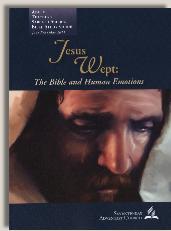|
||||||||||||||
Commentary on "Relationships""
Day 3: Monday, January 17, 2011 - Repaying Evil With Blessings
Overview
Monday’s lesson discusses repaying evil with blessings. It begins with the questions of the true intent of 1 Peter 3:8-12 and asks how the reader can apply these principles to his own life:
Finally, all of you, have unity of mind, sympathy, brotherly love, a tender heart, and a humble mind. Do not repay evil for evil or reviling for reviling, but on the contrary, bless, for to this you were called, that you may obtain a blessing. For “Whoever desires to love life and see good days, let him keep his tongue from evil and his lips from speaking deceit; let him turn away from evil and do good; let him seek peace and pursue it. For the eyes of the Lord are on the righteous, and his ears are open to their prayer. But the face of the Lord is against those who do evil.”
The example is given of a woman who baked apple pies for a neighbor couple who had been persistently criticizing them, and the unexpected gift changed the neighbors’ attitude. It then refers to David’s treatment of Saul, God’s anointed, in 1 Samuel 24, and points out that David wouldn’t take revenge against God’s anointed.
Observations
The point of the day’s lesson is well-taken: we are called to treat kindly even those who mistreat us. The depth to which this reality goes, though, is actually not explored.
First, the biblical principles of treating one’s persecutor’s with kindness is written to those who are God’s people and in relationship with Him. Natural man, those who have not been born again of the Holy Spirit, cannot successfully love their enemies. Without the love of God changing and filling them, they will not be able to love those who hurt them.
Moreover, the passage in 1 Peter 3 immediately follows Peter’s admonitions to husbands and wives:
Likewise, wives, be subject to your own husbands, so that even if some do not obey the word, they may be won without a word by the conduct of their wives, when they see your respectful and pure conduct. Do not let your adorning be external—the braiding of hair and the putting on of gold jewelry, or the clothing you wear— but let your adorning be the hidden person of the heart with the imperishable beauty of a gentle and quiet spirit, which in God's sight is very precious. For this is how the holy women who hoped in God used to adorn themselves, by submitting to their own husbands, as Sarah obeyed Abraham, calling him lord. And you are her children, if you do good and do not fear anything that is frightening.
Likewise, husbands, live with your wives in an understanding way, showing honor to the woman as the weaker vessel, since they are heirs with you of the grace of life, so that your prayers may not be hindered.
Read in context, the counsel about living in unity with one another has a more comprehensive application. Verses 8-12 cannot be read apart from 1-7, and there we discover that Peter is advising women to honor their husbands even when their husband behave in ungodly ways. In fact, the example Peter uses is Sarah, who honored her husband and did not give way to fear (v. 8). Verse 5 even says that holy women who hoped in God adorned themselves by submitting to their own husbands. Wives, in face, may win unbelieving husbands to the Lord Jesus by their “respectful and pure conduct”(v. 2).
Peter specifically says women are not to “fear anything that is frightening”. In other words, Sarah, even when Abraham allowed her to be taken by Abimelech, did not disrespect her husband—and God Himself protected her and made a way for her to escape.
Fear is described as the thing that defines acting outside of submission and respect and thus outside of God’s will.
Moreover, husband are to love their wives with understanding so their “prayers may not be hindered.” If husbands, according to Peter, are not loving their wives with understanding and showing them honor as the weaker vessels, their prayers will be hindered. Unkindness to one’s wife is a breach in a man’s relationship with the Father.
In the context of these solemn admonitions we must read the succeeding texts about living with humility and unity and blessing others when they mistreat us. Further, the context is not just about any mistreatment but about mistreatment for the sake of the Lord Jesus.
To be sure, believers are never to pay back evil for evil or to take revenge:
Repay no one evil for evil, but give thought to do what is honorable in the sight of all. If possible, so far as it depends on you, live peaceably with all. Beloved, never avenge yourselves, but leave it to the wrath of God, for it is written, “Vengeance is mine, I will repay, says the Lord.” To the contrary, “if your enemy is hungry, feed him; if he is thirsty, give him something to drink; for by so doing you will heap burning coals on his head.” Do not be overcome by evil, but overcome evil with good. (Romans 12:17-21 ESV)
This instruction, however, is within the context of the readers being born again is possible only we one surrenders one’s rights to the Lord Jesus and trust that His word will absolutely come to pass.
Conclusion
- We can’t simply decide to apply the principles of doing good to one’s enemies. We won’t succeed unless we are born again, and God’s power actually ministers to the other.
- Peter’s admonitions to husbands and wives are the immediate precursor to his comments about living in unity. This depth of submission and trust are the same depth as required for the unity Peter describes.
- Women are asked not to give way to fear but to respect and submit to their husbands the way Sarah submitted to Abraham, and husbands are asked to love their wives with understanding so their prayers will not be hindered with God.
- In the context of the new covenant, we are never to pay back evil for evil to anyone but to leave room for God’s own wrath against the unrepentant.
- We are asked to pay back evil with blessings, but this is only possible or expected within the context of being born again.
Copyright 2011 BibleStudiesForAdventists.com. All rights reserved. Revised January 17, 2011. This website is published by Life Assurance Ministries, Glendale, Arizona, USA, the publisher of Proclamation! Magazine. Contact email: BibleStudiesForAdventists@gmail.com.
The Sabbath School Bible Study Guide and the corresponding E.G. White Notes are published by Pacific Press Publishing Association, which is owned and operated by the Seventh-day Adventist church. The current quarter's editions are pictured above.
Official Adventist Resources
Standard Edition Study Guide Week 4
Teacher's Edition Study Guide Week 4


